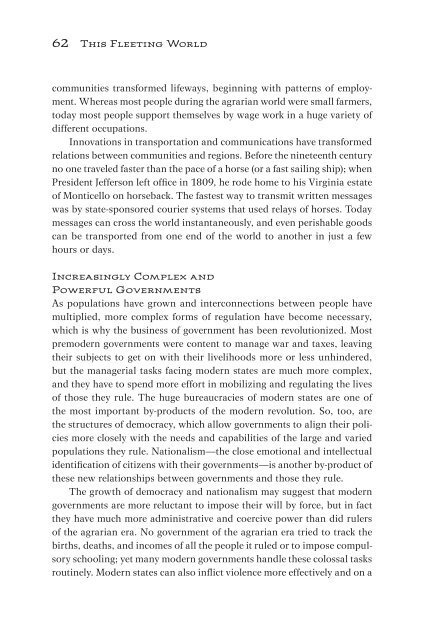This Fleeting World
This Fleeting World
This Fleeting World
Create successful ePaper yourself
Turn your PDF publications into a flip-book with our unique Google optimized e-Paper software.
62 <strong>This</strong> <strong>Fleeting</strong> <strong>World</strong><br />
communities transformed lifeways, beginning with patterns of employment.<br />
Whereas most people during the agrarian world were small farmers,<br />
today most people support themselves by wage work in a huge variety of<br />
different occupations.<br />
Innovations in transportation and communications have transformed<br />
relations between communities and regions. Before the nineteenth century<br />
no one traveled faster than the pace of a horse (or a fast sailing ship); when<br />
President Jefferson left office in 1809, he rode home to his Virginia estate<br />
of Monticello on horseback. The fastest way to transmit written messages<br />
was by state-sponsored courier systems that used relays of horses. Today<br />
messages can cross the world instantaneously, and even perishable goods<br />
can be transported from one end of the world to another in just a few<br />
hours or days.<br />
Increasingly Complex and<br />
Powerful Governments<br />
As populations have grown and interconnections between people have<br />
multiplied, more complex forms of regulation have become necessary,<br />
which is why the business of government has been revolutionized. Most<br />
premodern governments were content to manage war and taxes, leaving<br />
their subjects to get on with their livelihoods more or less unhindered,<br />
but the managerial tasks facing modern states are much more complex,<br />
and they have to spend more effort in mobilizing and regulating the lives<br />
of those they rule. The huge bureaucracies of modern states are one of<br />
the most important by-products of the modern revolution. So, too, are<br />
the structures of democracy, which allow governments to align their policies<br />
more closely with the needs and capabilities of the large and varied<br />
populations they rule. Nationalism—the close emotional and intellectual<br />
identification of citizens with their governments—is another by-product of<br />
these new relationships between governments and those they rule.<br />
The growth of democracy and nationalism may suggest that modern<br />
governments are more reluctant to impose their will by force, but in fact<br />
they have much more administrative and coercive power than did rulers<br />
of the agrarian era. No government of the agrarian era tried to track the<br />
births, deaths, and incomes of all the people it ruled or to impose compulsory<br />
schooling; yet many modern governments handle these colossal tasks<br />
routinely. Modern states can also inflict violence more effectively and on a


